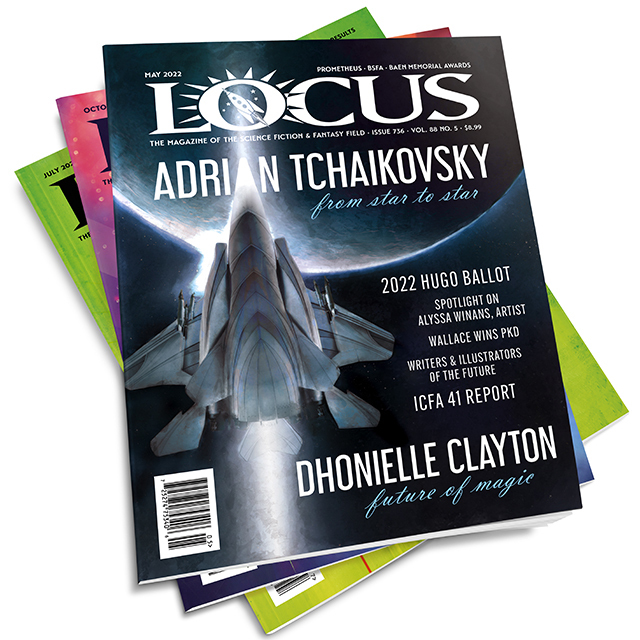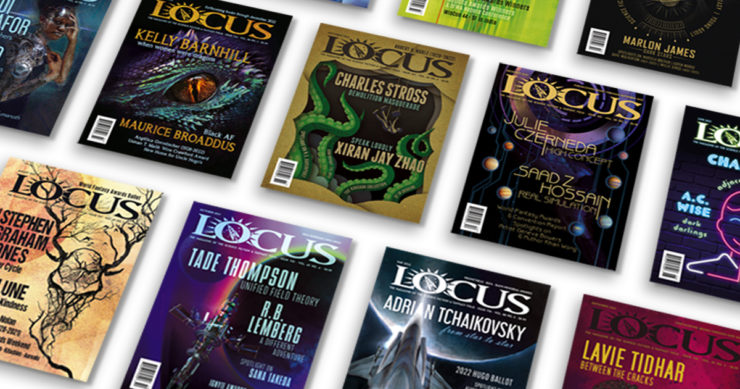The date was February 1, 2021, and my mentions were a mess. Nestled among the names of future friends like Zabe Bent, C.L. Clark, WC Dunlap, Meg Elison, Osahon Ize-Iyamu, Shingai Njeri-Kagunda, Sameem Siddiqui, Allison Thai, K.M. Szpara, Sheree Renée Thomas, and Suzan Palumbo, I found my own name beside my first published short story, YOUR ROVER IS HERE. Locus had just published its Recommended Reading List for 2020. This isn’t name-dropping: I was too ignorant to know I should be intimidated.
In the year before, ROVER debuted in Fiyah Literary Magazine before it reprinted as a podcast on LeVar Burton Reads. From my dream publication to a publication I didn’t know to dream for, Ahmad’s journey became my journey as more people became aware of my writing and more people became aware of me.
This is not a flex. I was waylaid and awestricken. I’m still unsure how my story was chosen, that’s why I headed to Locus’ website for the first time.
How’d you find yourself on the Locus website? When’d you get your first issue?
When was the last time you went to Daily SF? For me, it was a market I would submit to when I finally worked my mind around writing with compression and brevity.
But Daily Science Fiction announced on August 11, 2022 that it closed its submissions and disabled subscription renewal. The market would go on indefinite hiatus in mid-December, after 12 years of delivering speculative flash to inboxes and their website visitors.
We’ve seen others shutter over the past few years. Thankfully Apex came back but the odds aren’t as strong for Constelación, Glittership, Mermaids Monthly, Salt & Syntax, Shimmer, or Fireside. Like Daily SF, some of these markets were perennial favorites while others were upstart fledglings. In all cases, I thought we still had time to submit, to peruse, to luxuriate, to celebrate the magazines that exist for us.
Daily SF’s announcement took the Twitterverse by surprise. People recounted their favorite stories. Their first publications in the market. But mostly, they talked about the sense of loss as a prestige market for flash faded into obscurity and how they wish they could have done something about it.
***
After 54 years of speculative fiction journalism, we are in danger of losing Locus Magazine. With the rising costs of physical publishing, the mass exodus toward digital, and the rising costs of living, the margins at Locus narrow from month to month. And if no one takes action, we could lose this resource in less than a year.
Contributing reviewers return to publishing reviews for free. The six full-time staff members lose their salaries and benefits. Our community loses the Locus Awards and the honor of the Recommended Reading List. We lose a breadth of speculative journalism including short story and book reviews, spotlights, interviews, acquisition announcements, cover reveals, press releases, articles, essays for, by, and about people in speculative fiction.
I won’t pretend I had a Locus subscription when I got this news. To the contrary, I thought I had time. I thought that was something you acquired when you were farther along in your career. But it’s become clear that if we don’t start contributing to speculative fiction institutions, they might not be here when we think we’re ready for them and they definitely won’t be around for the generations of writers behind mine.
The brass at Locus is dreaming up new ways to be of service to the community at the same time that it’s searching for ways to sustain. By the time you’re reading this, the Indiegogo campaign will be live. There’s a subscription drive in the offing as well as an auction.
In the same way that readership and fundraising are the lifeblood of so many magazines we aspire to and love to read as fiction readers and writers, this journalistic institution needs you and I to help it keep its pages open. It is an archive of science fiction past and present, and Locus needs us to help it carry us into the future.

LP Kindred is a Chicagoan-Angeleno who writes, edits, and teaches Speculative Fiction from the axes of Gay and Black Identities. An alum of Hurston-Wright, VONA, and Clarion Workshops, Kindred has work featured or forthcoming in Fiyah Literary Magazine, LeVar Burton Reads, Speculative City, Escape Pod, PodCastle, and the inaugural Queer Blades anthology










